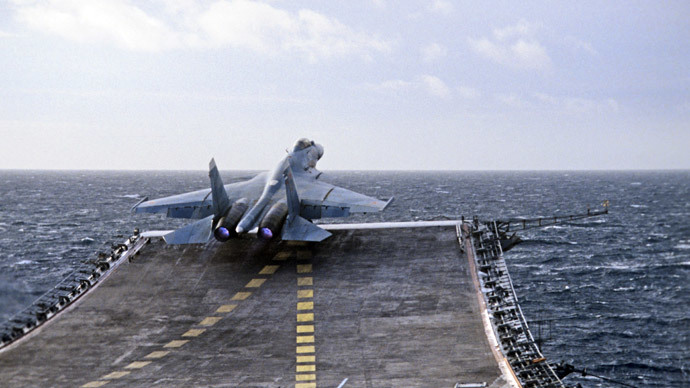Moscow to Sweden: Alleged 'colliding' jet 70km from civil route, used NATO tactics

Russia’s Defense Ministry has dismissed Sweden’s accusation that an unresponsive Russian military aircraft nearly collided with a passenger plane over the Baltic Sea. The ministry added that NATO planes in the area also have their transponders turned off.
READ MORE: Retraining reservists and rearming! Baltic countries got bellicose over ‘Russian threat’
The Russian aircraft in question was 70 kilometers away from the
flight path of a passenger jet taking off from Copenhagen, and
thus there were "no prerequisites" for collision between
the two, Defense Ministry spokesman Major General Igor
Konashenkov said in a statement. He also denied allegations that
the military jet was flying right above southern Sweden,
breaching its airspace.
“The flight was in strict accordance with international laws on
the use of airspace and did not violate state borders while
remaining at a safe distance from the routes of civil
aircrafts,” Konashenkov said.
Earlier on Saturday, Swedish Defense Minister Peter Hultqvist
told local radio that the Russian jet had its transponders turned
off so it could fly undetected, and claimed that it nearly
crashed into a passenger plane over Sweden.
“This is serious. This is inappropriate. This is outright
dangerous when you turn off the transponder,” Hultqvist
said.
Konashenkov called Hultqvist’s assessment of the Russian jet
being invisible – and thus dangerous – a “deception,”
pointing out that none of NATO's spy and patrol jets operating in
the region have their transponders turned on. That, however, does
not prevent Russia from detecting them.

“I want to particularly stress that the flights of NATO
military planes in the international space on Russia’s borders –
which have intensified more than threefold over the last months –
are always conducted with disabled transponders. But that does
not mean that the Russian airspace control are not able to detect
them,” the spokesman stressed.
As recently as December 12, the country’s detection system
spotted a NATO RC-135 reconnaissance aircraft in the same area
where the supposed “incident” with the Russian jet took
place – only closer to the civilian aircraft route, Konashenkov
revealed.
READ MORE: Mistaken identity: French plane entered Swedish air space – not Russian as reported
NATO has recently stepped up its military flights in the region,
due to a perceived Russian threat and the need to reassure the
allied Baltic states. It comes against the backdrop of tensions
over Ukraine.
Meanwhile, the defense minister of the non-NATO Sweden announced
that the nation is planning to retrain about 7,500 reservists who
have served in the Swedish army since 2004.
“The armed forces will be able to carry out fully-manned war
preparations which will result in increased operational
capacity,” Hultqvist explained, justifying the plans.
Peace activist Jan Oberg told RT that the move is in line with
the anti-Russian mood in the country’s media and politics,
triggered by the Ukraine crisis.
“The whole thing comes from the Ukrainian crisis – and that
was predominantly not created by Russia, but by the West,”
Oberg said. “It could be very much to show that we are doing
something. You have to follow up on the fact that the Swedish
media and political debate in this country are very anti-Russian
and that the interpretation what happened in Ukraine has not been
very balanced.”
“There is a very uniform media structure in this country. I
am sad to say that it is the case. It has become worse over
time.”
Back in October, Swedish media went on a wild goose chase for a
phantom submarine, alleged to be Russian – even though the
knowledge of identity was later denied by the Swedish military.
It all started with a blurry image. A week of searches led to
nothing, but cost the Swedish taxpayers almost $3 million
dollars.
READ MORE: Sweden confirms mysterious foreign
vessel entered its waters back in October
NATO’s reach
NATO has recently launched a massive military build-up of troops
in the Baltic states and other Eastern European NATO member
states, following the crisis in Ukraine.
The alliance argues that the expansion is needed to show support
and assure that NATO members are protected from a possible attack
by Russia.
The US-led alliance has also been boosting its presence through
military exercises held on a regular basis.
NATO’s new chief, Jens Stoltenberg, boasted of the bloc’s
successes in December.

“We have already boosted our presence in the eastern part of our alliance. We have five times more planes in the air. Our forces start an exercise every two days. And we have also increased the number of ships in the Baltic and the Black Seas,” Stoltenberg told reporters.
One of the most recent war games included servicemen from nine NATO member states participating in nearly two weeks of military exercises in Lithuania.
READ MORE: Iron Sword 2014: NATO stages massive military drill in Lithuania
However, Moscow sees NATO expansion towards its borders as an aggressive move, and a violation of post-Cold War agreements.
In early December, Russia’s deputy foreign minister Sergey Ryabkov called the build-up of NATO forces in Eastern Europe hostile and destabilizing to the Baltic, once the safest region in Europe.
READ MORE: NATO destabilizing Baltic by stationing nuke-capable aircraft – Moscow
In November, Moscow said that NATO exercises next to Russian borders have “a clearly anti-Russian nature,” and will scarcely contribute to European safety. [https://www.rt.com/news/204415-nato-europe-drills-russia/]












